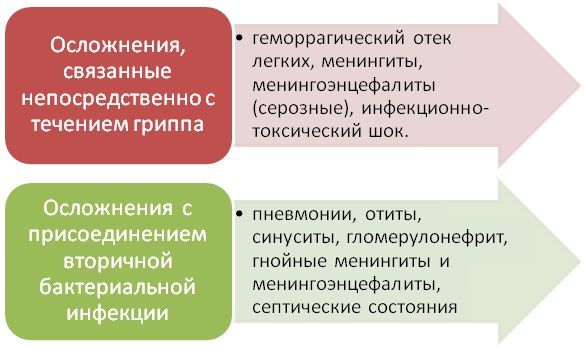
All iLive content is medically reviewed or fact checked to ensure as much factual accuracy as possible.
We have strict sourcing guidelines and only link to reputable media sites, academic research institutions and, whenever possible, medically peer reviewed studies. Note that the numbers in parentheses ([1], [2], etc.) are clickable links to these studies.
If you feel that any of our content is inaccurate, out-of-date, or otherwise questionable, please select it and press Ctrl + Enter.
Flu complications: what to watch out for?
Medical expert of the article
Last reviewed: 04.07.2025

The flu is not as scary as its complications. After the flu, you can suffer even more if you have not been treated correctly. What are the complications after the flu and what to do about them?
What is flu?
Influenza is a highly contagious viral disease that is most common in the fall and winter. Influenza attacks quickly, spreading through the upper respiratory tract and sometimes invading our lungs.
This ends with pneumonia, bronchitis and tracheitis - not very pleasant. You will have to undergo serious treatment.
Risk groups that develop complications from influenza
People at high risk for complications from the flu include adults over age 50, children aged 6 months to 4 years, adults and children with heart or lung disease, people with weakened immune systems (including people with HIV/AIDS), and pregnant women.
What are the symptoms of flu?
If you have the flu, you may have the following symptoms:
- Very high temperature (above 39 degrees Celsius).
- Headache.
- Fatigue (it can be very strong).
- Cough.
- Sore throat.
- Runny or stuffy nose.
- The body hurts a lot.
- Diarrhea and vomiting (more common in children than in adults).
When should you see a doctor to prevent flu complications?
If you have a high fever and difficulty breathing, see a doctor. Here are other symptoms that can be very serious:
- Fever with chills
- Coughing up blood or mucus from the lungs
- Difficulty breathing
- Breathing too fast
- Dyspnea
- Chest pain
- Wheezing
What are the most common complications of the flu?
The most common complications of influenza include viral or bacterial pneumonia, muscle inflammation (myositis), central nervous system disease, and heart problems including heart attacks, inflammation of the heart muscle (myocarditis), and inflammation of the lining around the heart (pericarditis).
Read also: |
Other complications of flu can include ear and sinus infections (otitis media and sinusitis), especially in children, dehydration, and worsening of chronic medical conditions such as congestive heart failure, asthma, or diabetes.
Is pneumonia a serious complication of the flu?
Yes, pneumonia is a common and very serious complication of the flu. Pneumonia can develop when the flu virus directly enters the lungs or when a bacterial infection develops during the flu. If viral or bacterial pneumonia makes you very sick, you may need to be hospitalized immediately.
With pneumonia, you may have chills, fever, chest pain, sweating, coughing up green or bloody mucus, an increased pulse, and bluish lips and nails due to lack of oxygen. Other symptoms of pneumonia include shortness of breath and sharp chest pain when you take a deep breath. Sometimes older people with pneumonia also feel like they have abdominal pain. When a bacterial infection occurs, pneumonia overlaps with the flu, and these symptoms may worsen, with a higher fever, a severe cough, and greenish sputum.
If you have a persistent cough or fever or difficulty breathing or chest pain — especially if these symptoms accompany another illness, such as the flu — you should definitely see a doctor. Good diagnostic workup, including a chest X-ray and sputum culture, can help your doctor diagnose pneumonia. Be aware that antibiotics can help bacterial pneumonias, but they cannot help viral pneumonias.

How long does pneumonia last?
Pneumonia usually lasts about two weeks, and even longer in young children, older adults, and those with weakened immune systems. People who may have chronic conditions, such as asthma, also suffer from pneumonia. Even the strongest people can feel tired and weak for a month or more after pneumonia.
What is the pneumonia vaccine?
To help prevent bacterial pneumonia, ask your doctor about getting the pneumococcal vaccine. There are currently 2 types of pneumococcal vaccine: pneumococcal polysaccharide vaccine (PPSV) for adults and pneumococcal conjugate vaccine (PCV13) for children.
The pneumonia vaccine is fairly safe and provides immunity against 23 subtypes of bacteria that commonly cause pneumonia.
If you are a healthy adult over 65, the pneumonia vaccine is recommended. Some experts suggest that adults under 55 may also receive the vaccine because their immune response is higher.
The pneumonia vaccine is also recommended for people at increased risk of developing the infection, such as those with heart disease, liver disease, lung disease, kidney failure, diabetes, various cancers, and sickle cell anemia. And the pneumonia vaccine is best for adults aged 19 to 64 who smoke cigarettes or have asthma. The pneumonia vaccine is not recommended for pregnant women.
Four doses of PCV13 pneumonia vaccine are recommended for all children younger than 2 years old. Children 2 through 4 years old who have not yet been vaccinated against pneumonia should get at least one dose. For children 6 through 18 years old with health problems, one dose of PCV13 pneumonia vaccine is enough, regardless of whether they have been vaccinated before.
How can you protect yourself from flu complications?
The flu shot or flu vaccine is the best way to prevent the disease. The flu increases the risk of pneumonia and other flu complications, so it makes sense to protect yourself from it.
Can complications from flu be prevented?
While many flu complications can be managed, some, depending on the state of your immune system, are quite difficult to prevent. So at the first sign of complications, contact your doctor for advice.


 [
[